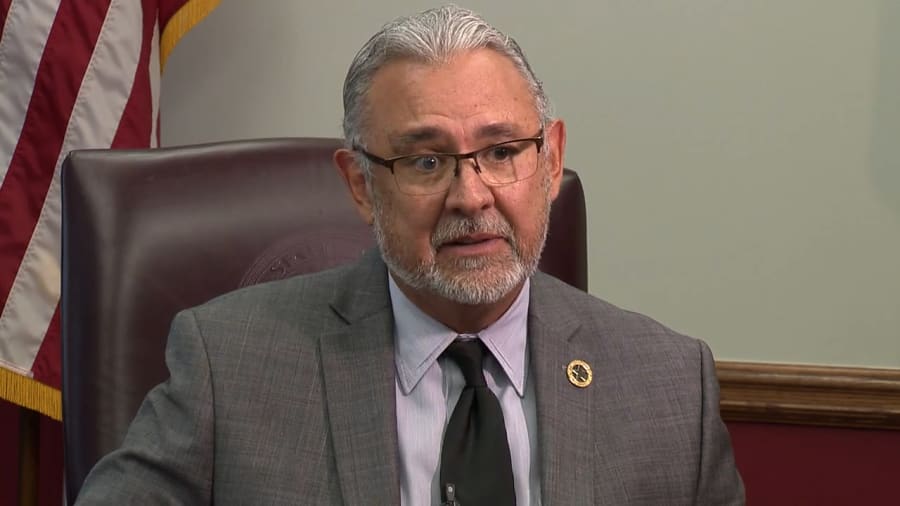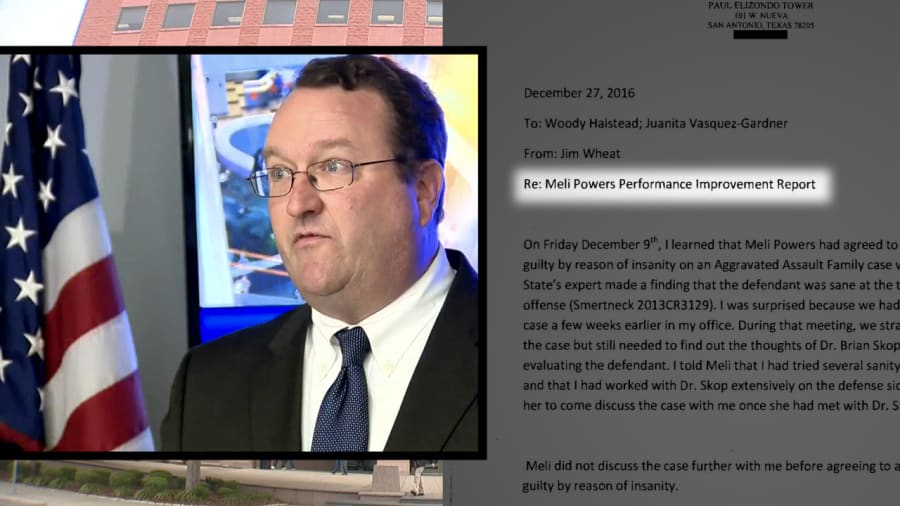SAN ANTONIO – The chief of the Bexar County District Attorney’s Family Violence Division previously resigned from the office after a performance improvement report questioned her courtroom strategy and behavior in the workplace, personnel records obtained by KSAT Investigates show.
The second tenure in the DA’s office for Angelica “Meli” Powers has also been hampered by complaints.
Both current and former DA employees who have worked with Powers during her most recent tenure told KSAT her issues with gossiping have continued.
Additionally, allegations were lodged in an exit interview late last year by a departing prosecutor who said that Powers runs the family violence unit based on favoritism and is difficult to communicate with.
Bexar County District Attorney Joe Gonzales offered a vote of confidence in Powers during an interview with KSAT, pointing to her conviction rate of over 80 percent on felony family violence cases this year.

“She’s the kind of chief that I can rely on to call all hours of the night. She’s the kind of individual that I can rely on to be a strong leader. She’s very proactive with her division,” said Gonzales.
Powers in a written statement told KSAT she has high expectations for herself and the employees working in her division.
“Every defense attorney knows that Meli will not go to trial.”
Powers resigned from the DA’s office in January 2017, two weeks after receiving a four-page performance improvement report.
The document, written by then-Special Crimes Chief Jim Wheat on December 27, 2016, included a wide range of criticisms of Powers.
Wheat wrote that Powers agreed to a finding of not guilty by reason of insanity for a defendant charged with felony aggravated assault of a family member.

Powers made the decision without discussing the move with Wheat or with any other prosecutors in the office with more experience than her, the report states.
“Meli disregarded my directions as her supervisor and did not look for experienced advice to guide her decision,” wrote Wheat, who called the move “highly unusual.”
The report states that two employees requested to move out of Powers’ unit within a week of her being assigned to it and that she should look for ways to be a leader instead of simply giving orders.
Wheat wrote another problem was that Powers actively looked to avoid trial, making it difficult to negotiate possible plea deals.
“At this point in her career, every defense attorney knows that Meli will not go to trial,” wrote Wheat.
The review also referred to Powers as a “constant source of office gossip - to the point that it interferes with her ability to focus on her work.”
Powers was always looking to cause internal problems and “stir the pot” when she did not get what she wanted, wrote Wheat.
The review also states that Powers instructed a third chair attorney to skip trial training without checking with a supervisor.
“Missing trial training will hurt her development - as will not going to trial,” wrote Wheat.
After reviewing the report, Wheat, who no longer works for the DA’s office, told KSAT he stands by the report.
Powers signed the four-page report and wrote that a written response would be forthcoming.
No written response, however, was included in her 189-page county personnel file.
Powers left the DA’s office in January 2017 and was then hired as an assistant attorney for the City of San Antonio.
She then left the city to work as a regional attorney for the Texas Department of Family and Protective Services in September 2017, records show.
“I have high expectations of myself and of employees within this Division.”
Powers officially returned to the DA’s office on January 2, 2019, Gonzales’ second day in office, county human resources records show.
The DA’s family violence unit is one of the largest divisions in his office, Gonzales said.
“We didn’t have access to any of those documentations ‘til we walked in January of 2019,” said Gonzales, when asked if he was aware of the performance improvement report prior to offering Powers the position of Family Violence Division Chief.
“Those opinions shared in that report are different from what I have found about Meli Powers over the years,” said Gonzales.
Judge Melissa Saenz, who stepped down from her prosecutor position at the end of last year after being elected a county court judge, specifically targeted Powers in her exit interview in late December.
Saenz wrote that issues with Powers went beyond micromanaging.

“She operates the division based on favoritism, she lies, she communicates to others private emails you send her, moved everyone in the division to different courts often with the exception of one atty. (attorney) who is her best friend,” wrote Judge Saenz.
“She is not easy to work with and not a supervisor you can talk to, which is disappointing,” wrote Judge Saenz.
While Gonzales did not directly dispute Judge Saenz’s impressions of Powers, he said his personal experience with Powers has not raised the same concerns.
“Frankly, I believe Meli Powers is too busy to gossip. I’ve never had anybody directly tell me that. Those are representations that I’ve heard from people on the way out,” said Gonzales.
Powers declined requests from KSAT to be interviewed for this story.
In a written statement she told KSAT:
“I am passionate about obtaining justice for victims of child abuse and domestic violence and work hard to improve the work of the Family Violence Division. For this reason, I have high expectations of myself and of employees within this Division. I ask that they give their best work as we seek justice for children and families in our community. It is their hard work and dedication that changes the lives of those who have been victims of abuse.”
Available records from the personnel file of Powers do not reveal any further critical reviews or any professional discipline during her current tenure.




